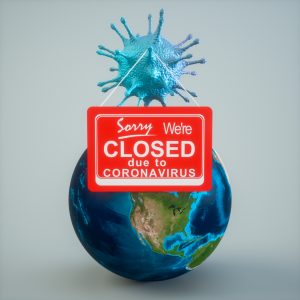Mary Ellen Helms, Loveland, OH
Warm-up Question
Imagine a world where commerce stopped immediately and you couldn’t just go to the store or order items which you need online. What is the number one item you’d like to have on hand in large quantities?
Be Prepared
Have you ever known a “prepper”? Preppers are people who prepare for emergencies or disasters by storing large quantities of items they might need. With some stockpiling dehydrated food, water, flashlights, extra batteries, and even ammunition, prepping has become a growing industry in the United States during the past few years. It has seen an enormous uptick during the Covid-19 Pandemic. In lots of ways, this makes sense. At the onset of the virus, there were shortages of everyday items such as toilet paper, cleaning supplies, and PPE (personal protection equipment). Fortunately, many of the supply chains have caught up to the extreme demand placed on them earlier this year.
While we might laugh at the idea of having lots of astronaut ice cream or beef jerky on hand (my favorite prepper snack!), people who prepare for disasters often weather the storm better than those who make no plans. “Be Prepared” is a motto often attributed to the Boy Scouts, but many other groups prepare us for emergencies and disasters. Check out https://www.ready.gov/kids/teens to learn about some of the ways teenagers can be helpful during the event of an emergency.
Being prepared is an important life skill all can develop. It goes beyond having what you need and extends to planning the response you’ll make when something unexpected happens.
Discussion Questions
- What are some ways that you and your family prepare for disasters?
- What unexpected events have happened in your life? How was your family prepared or not prepared for these occasions?
- How does talking about situations like preparedness increase or decrease your worry? Why might it be important to be prepared for disasters?
Twenty-third Sunday after Pentecost
(Text links are to Oremus Bible Browser. Oremus Bible Browser is not affiliated with or supported by the Evangelical Lutheran Church in America. You can find the calendar of readings for Year A at Lectionary Readings.)
For lectionary humor and insight, check the weekly comic Agnus Day.
Gospel Reflection
Jesus uses parables to teach us and so we can approach the Parable of the Ten Bridesmaids by asking, “What is Jesus trying to tell us?” We can’t tie a pretty bow on this parable. This one leaves us struggling.
Ten bridesmaids gather, waiting for the bridegroom. Five prepare with all they will need; five do not have the necessary oil for lamps. When the unprepared bridesmaids ask those with oil to share, the prepared ones answer, “No, go get some from the dealers!” The usual Sunday School answer would be, “We’ll share!” So, this seemingly selfish attitude tells us something more is going on here than a teaching on generosity. While the unprepared bridesmaids are gone, the door shuts and they lose their opportunity to share the feast .
This story is not one about sharing resources with the marginalized or outcasts – there are plenty of places where that value is clearly evident in scripture. This parable talks to us about being patient and prepared for the coming of the Messiah. Part of our responsibility is to be ready for the Messiah.
However, this parable says we can’t be perfectly prepared. “Keep awake, therefore, for you know neither the day nor the hour.” While we can seek to be as prepared as possible, another important message is to be patient and comfortable with the unknown. The mystery of faith (including the return of the Messiah) is alive!
Discussion Questions
- How would you have felt if you were one of the prepared bridesmaids? How would you have felt if you were one of the unprepared?
- What are some ways you are keeping watch for the coming of Jesus? How do our lives look when we are prepared and patient?
- What about this story leaves you wondering?
Activity Suggestions
- Using this link, work to make an emergency plan for your family or youth group. Talk about the materials you should have on hand, the important information you’d need, and how you would survive.
- Invite a speaker over Zoom or in life to talk about emergency preparedness. This could be someone from the Red Cross, an EMT, or someone else who works in disaster response.
Closing Prayer
God, we wait, but God, we can’t wait for you! We give you thanks for your Word which inspires us. Help us to live in a way that is both prepared and patient. We ask that you would point us to signs of your kingdom and help us light the way for others. In your holy name we pray. Amen.





